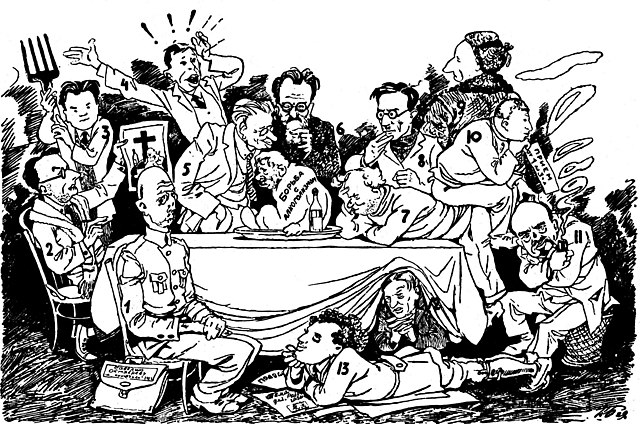Loading AI tools
Soviet and Russian satirical magazine (1922–2008) From Wikipedia, the free encyclopedia
Krokodil (Russian: Крокодил, IPA: [krəkɐˈdʲil] , lit. 'crocodile') was a satirical magazine published in the Soviet Union. The first issue was published on 27 August 1922 [1] as the satirical supplement to the Workers' Gazette (called simply «Приложения» [Supplement]).[2][3] When it became a separate publication, the name Crocodile was chosen at an editorial meeting from among a list of suggested animal names.[4] At that time, many satirical magazines existed, such as Zanoza and Prozhektor. Nearly all of them eventually disappeared.
You can help expand this article with text translated from the corresponding article in Russian. (January 2019) Click [show] for important translation instructions.
|
 The Unexpected Appendix. The cover of the first issue of Krokodil by Ivan Malyutin. | |
| Categories | Satire and humour |
|---|---|
| Frequency | 3 issues per month |
| Publisher | Rabochaya Gazeta, Pravda |
| Founded | 1922 |
| First issue | 27 August 1922 |
| Final issue | 2008 |
| Country | Soviet Union Russia |
| Based in | Moscow |
| Language | Russian |
| ISSN | 0130-2671 |
Krokodil was founded in 1922, first as a supplement to Rabochaya Gazeta ('Workers' Newspaper'), and was published once a week. Although political satire was dangerous during much of the Soviet period,[citation needed] Krokodil was given considerable license to lampoon political figures and events. Typical and safe topics for lampooning in the Soviet era were the lack of initiative and imagination promoted by the style of an average Soviet middle-bureaucrat and the problems produced by drinking on the job by Soviet workers. Krokodil also ridiculed capitalist countries and attacked various political, ethnic and religious groups that allegedly opposed the Soviet system.
Many notable persons contributed to the magazine, including Vladimir Mayakovsky, Mikhail Zoshchenko, Kukriniksy, and Yuliy Ganf.
Similar magazines existed in all the Union republics, and in several ASSRs and in other states of the Soviet bloc, e.g. Starshel ("Wasp") in Bulgaria, Eulenspiegel in East Germany, Urzica ("The Nettle") in Romania, Dikobraz ("Porcupine") in Czechoslovakia, and Szpilki ("Pins") in Poland.

Among the vocal compositions of Dmitri Shostakovich, who is known for his satirical character, there are 5 Romances on texts from Krokodil Magazine (1965), taken from the section of the magazine where were published real-life nonsense texts.
| Republic | Title | Translation |
|---|---|---|
| Ukrainian SSR | Перець | Pepper |
| Belarusian SSR | Вожык | Hedgehog |
| Uzbek SSR | Муштум | Fist |
| Kazakh SSR | Ара | Bumblebee |
| Georgian SSR | ნიანგი | Crocodile |
| Azerbaijani SSR | Кирпи | Hedgehog |
| Lithuanian SSR | Šluota | Broom |
| Moldavian SSR | Кипэруш | Pepper |
| Latvian SSR | Dadzis | Bur |
| Kyrgyz SSR | Чалкан | Nettle |
| Tajik SSR | Хорпуштак | Hedgehog |
| Armenian SSR | Ոզնի | Hedgehog |
| Turkmen SSR | Токмак | Mallet |
| Estonian SSR | Pikker | Pikker |
| Bashkir ASSR | Хэнэк | Pitchfork |
| Chuvash ASSR | Капкан | Trap |
| Komi ASSR | Чушканзі | Wasp |
| Mari ASSR | Пачемыш | Wasp |
| Tatar ASSR | Чаян | Scorpion |
| Udmurt ASSR | Шӧкыч | Hornet |
After the 1991 dissolution of the Soviet Union the magazine was discontinued (2000). It was reinstated in 2005 in Russia, issued monthly, headquartered in Moscow, and with editor-in-chief Sergei Mostovshchikov. The reinstated version, deliberately printed on old Soviet-style paper, ceased publication in 2008.

Seamless Wikipedia browsing. On steroids.
Every time you click a link to Wikipedia, Wiktionary or Wikiquote in your browser's search results, it will show the modern Wikiwand interface.
Wikiwand extension is a five stars, simple, with minimum permission required to keep your browsing private, safe and transparent.